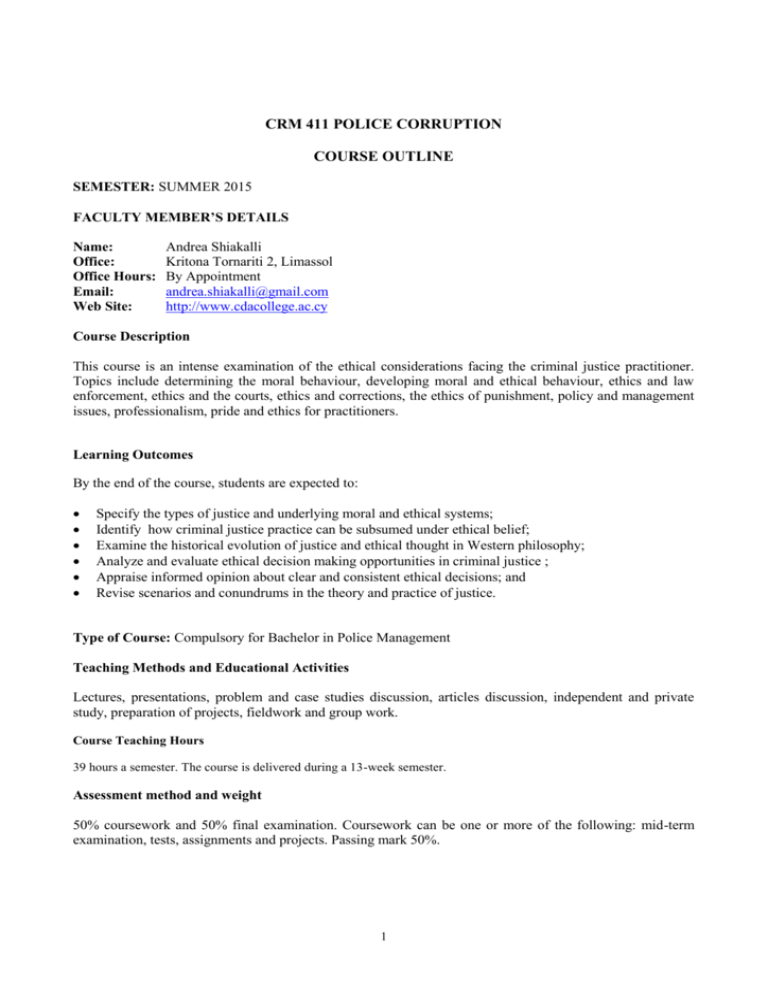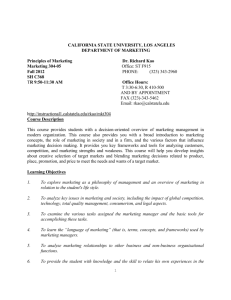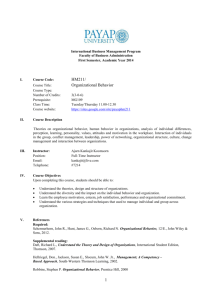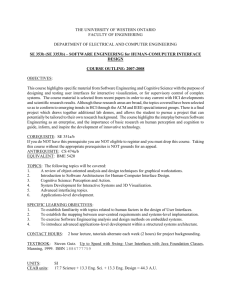Course Outline
advertisement

CRM 411 POLICE CORRUPTION COURSE OUTLINE SEMESTER: SUMMER 2015 FACULTY MEMBER’S DETAILS Name: Office: Office Hours: Email: Web Site: Andrea Shiakalli Kritona Tornariti 2, Limassol By Appointment andrea.shiakalli@gmail.com http://www.cdacollege.ac.cy Course Description This course is an intense examination of the ethical considerations facing the criminal justice practitioner. Topics include determining the moral behaviour, developing moral and ethical behaviour, ethics and law enforcement, ethics and the courts, ethics and corrections, the ethics of punishment, policy and management issues, professionalism, pride and ethics for practitioners. Learning Outcomes By the end of the course, students are expected to: Specify the types of justice and underlying moral and ethical systems; Identify how criminal justice practice can be subsumed under ethical belief; Examine the historical evolution of justice and ethical thought in Western philosophy; Analyze and evaluate ethical decision making opportunities in criminal justice ; Appraise informed opinion about clear and consistent ethical decisions; and Revise scenarios and conundrums in the theory and practice of justice. Type of Course: Compulsory for Bachelor in Police Management Teaching Methods and Educational Activities Lectures, presentations, problem and case studies discussion, articles discussion, independent and private study, preparation of projects, fieldwork and group work. Course Teaching Hours 39 hours a semester. The course is delivered during a 13-week semester. Assessment method and weight 50% coursework and 50% final examination. Coursework can be one or more of the following: mid-term examination, tests, assignments and projects. Passing mark 50%. 1 Police Management Grading System % Grade 90-100 80-89 75-79 65-74 60-64 55-59 50-54 Below 50 Grade A B+ B C+ C D+ D F Grade Meaning Grade Points per Credit Excellent 4.00 Very Good 3.50 Good 3.00 Above Average 2.50 Average 2.00 Below Average 1.50 Poor 1.00 Failure 0.00 ASSESSMENT Class Participation/Tests: Assignments: Mid-term examination: Final examination: 5% 15% 30% 50% Assignments: The students will be assigned to carry out a theoretical research in the existing literature over the topics covered in the course outline, or to carry out an exercise using the Internet. The faculty member will determine the character of the assignment. The students are requested to deliver their assignments on an individual or group basis and on time. Although collaboration among the students for the preparation of the assignments is encouraged, students should avoid copying. Presentations and discussions over the assignments will follow. Mid-term examination: The mid-term examination will be of one and a half hours. It will mostly be essay questions and/or multiple-choice questions. Final Examination: The final examination will be of two hours. It will be comprehensive and it will test the students on the material covered during the semester. Required Textbook Title: Author(s): Publisher: Edition: Year: Police Corruption: Preventing Misconduct and Maintaining Integrity Tim Prenzler Taylor & Francis Illustrated 2010 Title: Author(s): Publisher: Edition: Year: Ethical dilemmas and decisions in criminal justice Pollock, J. Cengage Wadswroth Seventh 2012 Web sites http://www.spectator.co.uk/features/9461322/the-shocking-truth-about-police-corruption-in-britain/ http://www.usip.org/sites/default/files/SR%20294.pdf https://web.stanford.edu/class/e297c/poverty_prejudice/paradox/hwhite.html http://cyprus-mail.com/2013/11/20/pledge-on-police-corruption-clampdown/ 2 LEARNING OUTCOMES TABLE Week 1 Learning Outcomes and Content of the Course Introduction Activities Discussion Questions What is really real? Official paradigm and operational code(s) Case Study: Officer Dowd (New York) 2 Chapter 1 What is corruption? Discussion Questions Definition and forms of corruption Case Study: Police organization, police culture and dirty work Inclusion, moral career and slippery slope 3 Chapter 2 The US: from pad to crew Guidelines for the Assignments and Project. Discussion Questions Police corruption in America Case Study: New York and the NYPD Chicago, LAPD, and Sea Girt Violence, drugs, police crime and corruption: New York, Miami and Los Angeles Reform and good departments 4 Chapter 3 The Netherlands: Amsterdam and the ‘IRT’ affair Discussion Questions Amsterdam Case Study The ‘IRT’ affair Outline the Methodology that will be adopted for the project. Chapter 4 5 The UK: London, miscarriages of justice and Northern Discussion Questions Ireland London: the Met, Mark and investigations Case Study Miscarriages of justice Northern Ireland Chapter 5 6 ‘Creatures in between’: pathways into police deviance and Discussion Questions corruption Case Study: 3 ‘Groovy Gang’: SERCS and Neil Putnam Prince of the City: SIU and Bob Leuci Joining and leaving the ‘Club’ Chapter 6 7 Scandal, reform and accountability Discussion Questions Scandal and reform Police accountability in the UK Police accountability in the US 8 Chapter 7 Revision, Mid-term Examination. 9 Conclusion: sticky fingers and dirty hands Discussion Questions Sticky fingers Dirty hands Chapter 8 10 System Controls and Risk Management Strategic Intelligence Complaints Principles of Complaint Profiling and Early Intervention Individual Profiling: Some Case Studies The Victoria Police Early Intervention System Early Intervention: Unit Profiles Broader Risk Management and Threat Assessments High-Speed Pursuits Data Access Controls and Data Trails Informant Management Due Process in Investigations and Prosecutions Corruption Hazards and Rotation of Personnel Miscellaneous Areas of High Risk Intelligence Gathering for Investigations and Covert Operations Maintaining Momentum and Maximizing Yields 4 Discussion Questions 11 Advanced Techniques Discussion Questions Integrity Testing Case Study: Targeted and Random Tests Legal and Ethical Issues Associated Issues Drug and Alcohol Testing Covert Surveillance Undercover Agents Financial Audits and Indirect Incapacitation Strategies Witness Protection Programs 12 External Oversight Discussion Questions Stakeholder Perspectives Case Study: Inquiries Deliver the Final Project Oversight Agencies Complainants Police Perspectives Public Opinion Civil Liberties Groups Government Reviews The Performance of External Agencies A Model Oversight System 13 Project Presentations, Revision NOTES: Class attendance and participation in class discussion is expected and absences will affect your final grade. The due dates for assignments are non-negotiable and late work will be penalized. All assignments are to be professional in appearance and type. OTHER INFORMATION Class attendance: Students are expected to attend the classes regularly and be punctual. Humane matters: Inform your faculty member for any un-expectancies that may occur, thus not allowing you to carry out your responsibilities. 5 Library: You are advised to visit regularly the library of our College and read articles published in academic journals. Do not hesitate to ask the librarian to inform you about the facilities offered by our library and how you will use them in a productive way. I recommend you studying regularly among others, articles of your interest, published in international journals. 6




